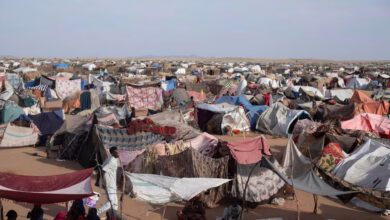Darfur’s leading rebel group and the government of Sudan have a bitter history of failed cease-fires and peace deals. But upcoming elections and dramatically improved ties with neighboring Chad have raised hopes that a truce to be signed Tuesday will finally put an end to seven years of devastating war.
Despite the ebbing of violence in the last year, the United Nations estimates that some 300,000 people have died and 2.7 million have been displaced since ethnic African tribesman in the vast arid western Darfur region took up arms against the Arab-dominated central government.
The government and the rebel Justice and Equality Movement are to sign the truce agreement in Doha, Qatar, after a year of negotiations.
The upturn in relations between Sudan and Chad gave a major boost to the truce agreement because the two countries had once accused each other of supporting the other’s rebels.
Sudanese President Omar al-Bashir is also facing war crimes accusations abroad and an election in April, making him eager for some kind of breakthrough to improve his image abroad and at home.
The signing of the framework agreement will be attended by the United States, the UN and Arab representatives as well as by the president of Chad.
US State Department spokesman P.J. Crowley said Monday that the temporary cease-fire agreement is an important step toward reducing violence in Darfur.
The end of the long-running animosity between Sudan and Chad–which sponsored the truce only days after declaring the end to its long proxy war with Sudan–could be the deciding factor in this agreement’s longevity.
"I can’t deny that normal relations between the two countries will help," Tahir al-Faki, a senior rebel member of JEM, said in a telephone interview before heading to Doha for the signing.
The deal provides for a temporary cease-fire that is to lead to political negotiations by 15 March on wealth sharing, compensation and political representation.
JEM is the most powerful rebel group, but not the only one. The splintering of the rebels into dozens of factions threatens to undermine any peace on the ground.
The dozens of rebel factions have coalesced into two main groups to unify their demands and negotiating position in the year-old negotiations in Doha. They were irked by the separate cease-fire with JEM.
The Sudanese government, however, was quick to assure the rebels of its continuing commitment to a comprehensive agreement.
"We believe that Darfur can’t be solved bilaterally. We hope we can negotiate with the other groups to reach a final and comprehensive agreement," said Amin Hassan Omar, the official leading the year-old negotiations. He hailed the truce with JEM as an "important breakthrough."
JEM, whose leader, Khalil Ibrahim, was a government minister before he joined the Darfur rebellion, is already pressing the government to postpone elections so it can take part.
Sudanese government spokesman Rabie Abdel Attie said delaying elections was currently not on the table.
Al-Bashir, meanwhile, faces a tough international challenge. He is the first sitting head of state to be wanted by the Hague-based International Criminal Court, where he stands accused of war crimes committed in Darfur.
A settlement in Darfur would defuse criticism abroad and boost his legitimacy at home ahead of the elections.
Skirmishes in Darfur between JEM and government forces followed the announcement Saturday that a truce deal was to be signed. Al-Faki of JEM said his troops repelled a government attack over the weekend in western Darfur and seized government vehicles.
"On the political side we are negotiating. On the military side, we are not laying down our arms and we are very vigilant," he said.
A major rebel group that launched the rebellion, the Sudan Liberation Movement, has shunned the peace talks. Although weakened by splintering, the group’s leader remains popular among Darfur’s refugee community.




